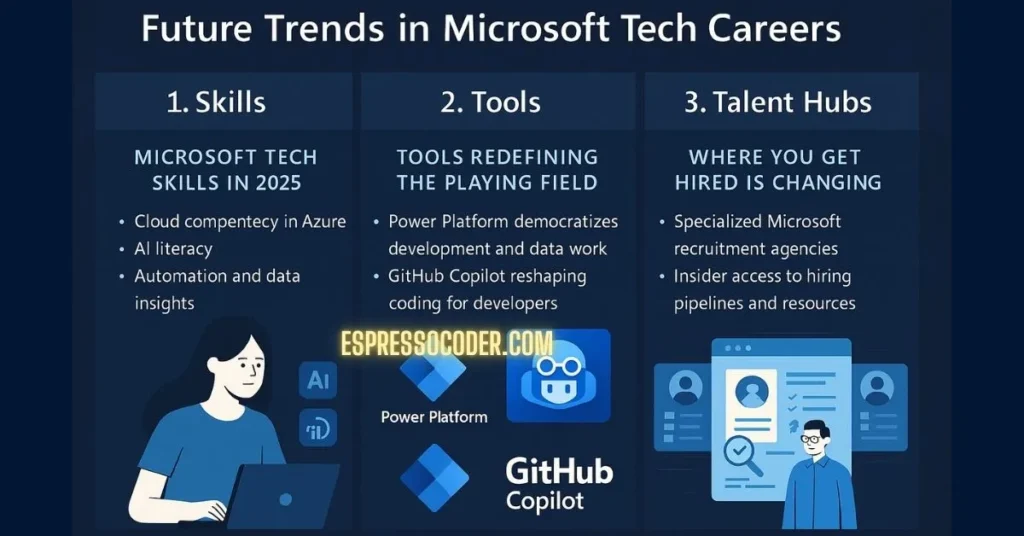The tech world doesn’t slow down—and Microsoft is keeping pace at the forefront of innovation. As we look ahead to 2025, it’s becoming increasingly clear that the road to success in Microsoft tech careers is no longer gated by traditional credentials or rigid job titles. Today, it’s about knowing the right tools, building adaptable skills, and navigating the right hiring channels to find your fit.
In this post, we break down the three pillars shaping Microsoft tech career paths in 2025: skills, tools, and talent hubs—and how anyone can tap into them to grow or pivot their career.
Contents
1. Microsoft Tech Skills Are Evolving—So Should You
Gone are the days when Microsoft tech careers were reserved solely for enterprise developers and IT administrators. The ecosystem now supports a wider range of specialties—from low-code creators and business analysts to AI engineers and DevOps professionals.
So what skills are trending?
- Cloud competency in Azure is nearly essential. Whether you’re an administrator or a data engineer, understanding how Microsoft’s cloud platform works will keep you in demand.
- AI literacy is a fast-rising skillset. With Microsoft’s investment in OpenAI and integration of Copilot in tools like GitHub and Microsoft 365, being able to work alongside AI tools is a game-changer.
- Automation and data insights are central. Power BI, Power Automate, and Dataverse are turning ordinary business users into creators of intelligent solutions.
If you’re looking to reskill or pivot into tech, this expanding landscape offers a wider on-ramp than ever before.
2. Tools That Are Redefining the Playing Field
The barrier to entry in Microsoft tech careers has dramatically lowered thanks to new tools that democratize development and data work.
Take Power Platform—a suite of applications that enables professionals to build apps, analyze data, and automate workflows without writing complex code.
This is helping businesses empower their workforce from within, and it’s opening doors for career changers who never thought they’d work in tech.
On the flip side, developers are also being transformed. Tools like GitHub Copilot are reshaping the way code is written, helping experienced engineers focus more on architecture and less on boilerplate.
These tools don’t replace human skill—they amplify it. Learning to work with them, not against them, is the smart move in 2025.
3. Where You Get Hired Is Changing Too
It’s not just the skills and tools that are evolving. The hiring process itself is also seeing a shift.
While job boards and company portals are still in play, specialized Microsoft recruitment agencies are playing a bigger role in helping job seekers land the right opportunities—faster.
These agencies often have insider access to hiring pipelines for enterprise tech roles—especially those requiring Microsoft certifications or platform expertise. They can also help candidates craft better résumés, optimize LinkedIn profiles, and align their skills with roles companies are actively filling.
Whether you’re looking for a Power Platform developer role or an Azure architect position, leveraging specialized recruiters can make all the difference.
Final Thoughts: The Future Is Flexible, but Fast-Moving
The Microsoft job market is broader, more inclusive, and faster-moving than ever before. Whether you’re just starting out, shifting careers, or deepening your specialization, 2025 is all about aligning with the tools, skills, and hiring ecosystems that are shaping the next decade of tech.
From embracing AI-powered tools like GitHub Copilot, to learning through low-code platforms like Power Platform, to getting matched with roles through specialized agencies—there’s no one path, but there’s definitely a smarter one.
And now’s the time to start walking it.

